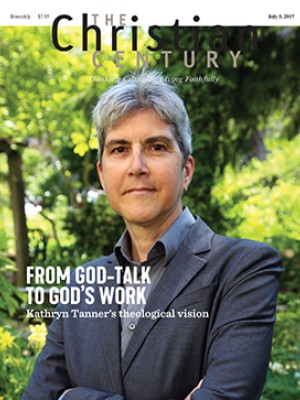July 30, Ordinary 17A (Romans 8:26–39; Matthew 13:31–33, 44–52)
We can be joined by our suffering, not just separated.
Suffering separates us. This is its most diabolical work. It draws a circle around us and slowly shrinks our space—separating peoples, then families, working all the way down to the individual body. There it finds its perfect work in isolating a person from others and, finally, even splitting mind from body, soul from beating heart.
This is why a creature’s suffering often becomes the playground for the demonic, where those who have made themselves agents of death find ways to manipulate others in their suffering in order to serve their own interests and fulfill their own ends. We live always in the temptation to yield to suffering’s seductive power to separate us, because we live with modern society’s wounds: racism, patriarchy, nationalism.
Read our latest issue or browse back issues.
Such wounds mark us as peoples eager to see separate worlds instead of a world—to construct a present based on a future in which each people must go it alone. Seeing the world in this way might not be counterfactual, but it is tragic.
It is tragic that so many men see assaults to their masculinity in their painful lack of control over their financial, cultural, and social worlds—and then double down on solutions that sanction the oppression of women. It is tragic that, in the face of murder, violence, and hatred, the desire to defend and protect easily mutates into not only fear and hatred but an obsessive commitment to cultural and racial boundaries and geographic borders. Nationalism has always been the parasite of suffering, feeding from its strength and renewing itself with each toxic shock of brutality and terrorism, whether illegal or state-sanctioned.
In the Western world, black suffering always pulls toward separation. This suggests that we live in a difference that cannot be overcome, a difference not of culture or language but of sight and truth. Black suffering tempts so many people to turn a penultimate racial truth into an ultimate truth: that white Western subjectivity cannot be penetrated by the good news—by any news—and will always exist as a permanent structure of harm to black flesh. The deepest horror of suffering is that it wants to be our foremost teacher, guiding us into the ways of the world and showing us how to separate the real from the false.
Too often people imagine that forgetting suffering is the antidote to our wounds and the only way to enter a future freed from suffering’s effects. So ignoring suffering has become a skilled practice in the West—especially in the United States. Here we have cultivated ways to not see what is in front of our eyes, to not hear the screams and sirens that echo through our cities and towns. We have cultivated a selective focus on suffering, looking either at the kinds most immediate to us or those that do us no harm and demand nothing from us. We vacillate, that is, between narcissism and voyeurism.
Now, my own suffering and that of my loved ones should occupy my attention. And it is indeed difficult to look away from the suffering spotlighted in the media. The problem is not what we see, but what we don’t see: suffering joined.
In this week’s reading from Romans we learn that in God, suffering no longer separates. God will not now or ever withhold the divine life from our suffering. Flesh holds flesh, bone meets bone, and blood is joined. God is with us, in us, for us. Suffering will never thwart divine love for us, and what God joins together no power anywhere can separate. This true word has breathed through centuries to Christians, providing inexplicable confidence and irrepressible joy in the midst of monstrous horrors. It has turned suffering from a killing field to a place where God is working out flourishing life for us and with us.
The subtlety of this point is critical. God turns suffering toward the good. God does not make suffering good, or for our good. Christians—and their critics—sometimes get this twisted.
Paul’s true word has not been allowed in our time to do a further good work in us. If suffering does not separate us from God, neither should it separate us from one another—not even if we are the causes of that suffering. We are joined together in our suffering, and through the Holy Spirit Christians have the capacity to enact a joined suffering. This capacity is not sentimental or wishful. It is a real power to encircle people in their suffering, joining them to shared care and shared hope.
We are people who can and should resist the balkanization and segregation that rides in with suffering, that turns people into solitary sojourners through this world. We have neglected our birthright because we have found it easier to hear the suffering that is near and tune out distant cries. We have found it easier to live in histories that school us in ethnic chauvinism: my people must come first.
As long as we neglect our power to join people together in their suffering, we will yield the ground to nationalists and zealots who are more than willing to guide us toward visions that traffic in death. They envision a world that will not last, a world where the efforts to end my people’s suffering lead to segregation, isolation, and usually violence.
It is easy to see the appeal of such a vision, its utility in this chaotic moment in history. Yet Christians understand that the gospel is the pearl of great value described in this week’s reading from Matthew, the thing that is worth giving up everything to have. It is what joins us to God, especially in our suffering—and refuses to release us to isolating despair.






